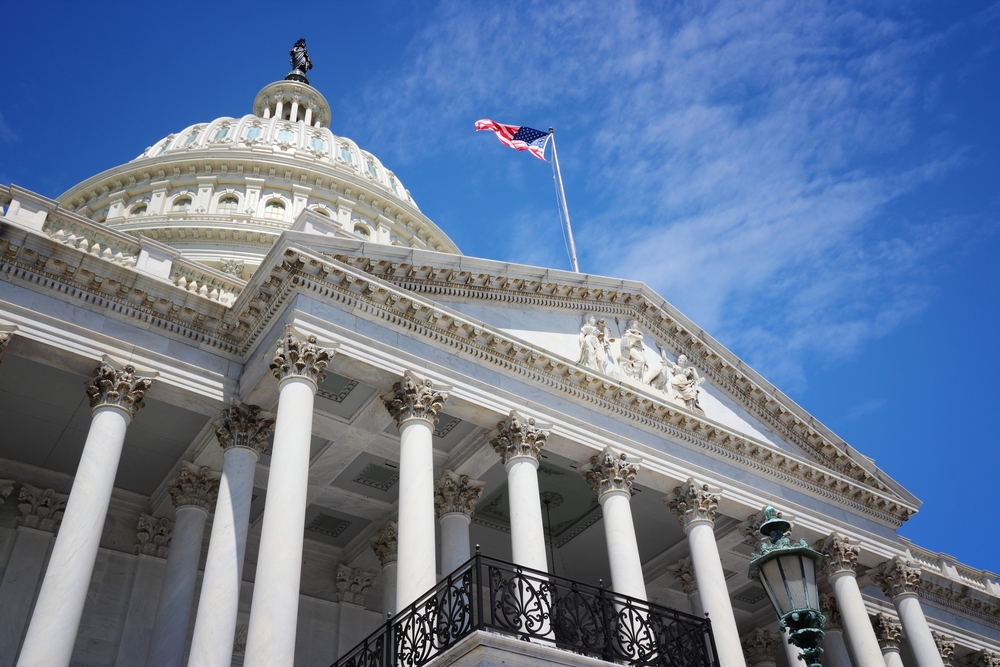Senate Race Runoffs in the Peach State

By Michelle Rutter Friberg, NCIA’s Deputy Director of Government Relations
As you’ve probably heard by now, which party controls the Senate won’t be known until January 5 — but those results could quite literally determine if marijuana will become federally legal over the next few years.
In Georgia, no candidate can advance through a primary or a general election system without first earning more than 50% of the votes. If no one does, the top two vote getters advance to a runoff election, ensuring that one will earn the majority of votes cast.
This year, the state’s two Senate races — one regular, the other a special election to fill the remainder of a retired senator’s seat — have gone to a runoff. The first will be between incumbent Sen. David Perdue (R) and Democrat Jon Ossoff; the latter will be between Republican Sen. Kelly Loeffler and Democrat Rev. Raphael Warnock. If Democrats win both seats, the Senate will be tied 50-50, and Vice President-elect Kamala Harris would be the tie breaking vote.
It can’t be overstated that the Democrats have an uphill (but not impossible!) battle ahead. In November, Sen. Perdue garnered 86,000 more votes than Ossoff, while Warnock benefited from the fact that two Republicans — both Sen. Loeffler and Rep. Doug Collins — were on the ballot in his race, splitting the party’s votes.
And of course, it’s 2020, so I would be remiss not to mention the pandemic! The runoff is taking place in an off-election year in (what will likely still be) the middle of a serious surge of COVID-19 cases. On top of that, Republicans historically have a stronger track record of turning out in runoffs in the state.
Despite all of that, Democrats are working hard to turn out the vote and organize early. In addition to relying heavily on both first-time voters and Black voters, Democrats are also hopeful that young voters will be the key to winning the runoff in January. Ossoff recently said:
“There are 23,000 young people here in Georgia who will become eligible to vote just between the November election and this January 5 runoff, and a decade of organizing, much of this work led by Stacey Abrams, has put the wind in our sails here in Georgia. What we’re feeling for the first time in four years is hope.”
As I said before, which party controls the Senate could quite literally be the difference between whether or not cannabis could become federally legal in the next one to two years. Senate Minority Leader Chuck Schumer (D-NY) was interviewed in October and said:
“I’m a big fighter for racial justice, and the marijuana laws have been one of the biggest examples of racial injustice, and so to change them makes sense. And that fits in with all of the movement now to bring equality in the policing, in economics, and in everything else. Our bill is, in a certain sense, at the nexus of racial justice, individual freedom and states’ rights.”
Schumer was referencing the bill he introduced, the Marijuana Freedom and Opportunity Act, which would remove cannabis from the Controlled Substances Act, allowing states to set their own policies. It also includes provisions to help funding to cannabis businesses owned by women and people of color through the Small Business Administration; funding studies on traffic safety, impairment detection technology, and health effects of cannabis; restricting advertising that could appeal to children; and setting aside $100 million over five years to help states develop streamlined procedures for expunging or sealing prior cannabis convictions.
Time is of the essence. Voters must be registered by December 7 in order to participate in the runoff election. If you’re in Georgia, or know anyone who is a resident, please check out the Cannabis Voter Project to learn more and make sure you’re ready to vote. If you can, consider making a donation to the Ossoff campaign or the Warnock campaign. The future of cannabis legalization in this country depends on it!
What to Watch in the Lame Duck Session

by Madeline Grant, NCIA’s Government Relations Manager
 Following the presidential election, we’ve entered the lame-duck session. This occurs after an election, but before new members are sworn in, and allows for time on the legislative calendar for Congress to pass additional legislation. Before Congress heads home for the holidays, a new administration takes office, and the 117th Congress returns, let’s take a look at what to keep an eye on during the lame-duck session.
Following the presidential election, we’ve entered the lame-duck session. This occurs after an election, but before new members are sworn in, and allows for time on the legislative calendar for Congress to pass additional legislation. Before Congress heads home for the holidays, a new administration takes office, and the 117th Congress returns, let’s take a look at what to keep an eye on during the lame-duck session.
Banking Access
The House of Representatives has approved the SAFE Banking Act in some form THREE times in just over a year. The text of the Secure and Fair Enforcement (SAFE) Banking Act has passed through two different COVID-19 relief packages on the House side: the HEROES Act, and the HEROES Act 2.0, and also passed as standalone legislation in September 2019. However, in the upper chamber, we’ve seen Senators criticize including marijuana components in coronavirus legislation, arguing that it is not germane to the issue at hand. Specifically, Senate Majority Leader McConnell (R-KY) took to the floor to complain that the House bill provides “special treatment to the marijuana industry,” stating that the legislation “mentions the word ‘cannabis’ more times than the words ‘job’ or ‘jobs.’” Regardless, it’s evident that SAFE banking has bipartisan support and could help mitigate the spread of the virus by ending the industry’s reliance on cash transactions.
Additionally, Senate Minority Leader Chuck Schumer (D-NY) introduced a coronavirus relief bill last month that contains the SAFE Banking Act. We’ve seen pushback from the Republican-controlled Senate and the Trump administration, however, Senator Schumer’s inclusion of cannabis provisions is a positive sign that Democrats will make an effort to continue to push for these provisions. As Congress and the Trump Administration continue to negotiate coronavirus relief legislation, we will continue to keep our eyes on banking. Also, a friendly reminder to call our representatives and senators and encourage them to support cannabis banking reform. If they are already a champion on our issues, thank them for their support.
The Marijuana Opportunity, Reinvestment and Expungement (MORE) Act
Regardless of all of the trials and tribulations that 2020 has brought, there is still great excitement and optimism around the MORE Act! House Majority Leader Steny Hoyer (D-MD) confirmed that marijuana legalization is still on the table before the presidential transition and will get a vote in December. Previously, Representative Hoyer announced this past summer that the chamber would vote on the MORE Act in September, but that plan was postponed following pushback from certain offices who were concerned about the optics of advancing cannabis reform before passing another coronavirus relief package.
The MORE Act is the most comprehensive cannabis legislation to date. The bill would: federally deschedule cannabis, completely removing it from the Controlled Substances Act, expunge the records of those with prior marijuana convictions and impose a federal give percent tax on sales, revenue from which would be reinvested in communities most impacted by the drug war. Additionally, the legislation would also create a pathway for resentencing for those incarcerated for marijuana offenses, as well as protect immigrants from being denied citizenship over cannabis and prevent federal agencies from denying public benefits or security clearances due to use. The fact that we have a potential vote on the MORE Act before the end of the 116th Congress is exciting news for the cannabis community. As we gear up to the end of the year, look out for updates on the MORE Act, and remember, please call your representative and senators and urge them to support this significant piece of cannabis legislation.
Success Through Hardship in the 116th Congress
This year has been unlike any other year we’ve faced as a country. Since March, Congress has exhausted their legislative efforts to agree on coronavirus relief bills. With differences on both sides of the aisle and with the administration reaching any sort of legislative success seems near impossible. However, on a positive note we’ve seen our champions on Capitol Hill not give up on cannabis-related provisions. Although we are faced and halted by frustrations in the Republican-controlled Senate, we still see members of Congress working to include the much-needed cannabis reform our nation is calling for. Not to mention Election Day – Arizona, Montana, New Jersey, and South Dakota all passed measures making cannabis legal and regulated for adults, while Mississippi and South Dakota chose to legalize medical cannabis. Every success and victory in cannabis policies around the country creates more momentum for Congress to fix the out-dated cannabis laws. As we wrap up the 116th Congress, we will be left with more momentum than ever before to enter the 117th Congress to reach new legislative victories.
The Push for Equity in the Cannabis Industry

by NCIA Editorial Staff
It’s no secret that the cannabis industry still has much work to do in terms of building a diverse, equitable, and inclusive workforce. But what barriers stand in the way, and how can we overcome them?
According to the ACLU, cannabis use is roughly equal among African-Americans and whites, yet African-Americans are nearly four times more likely to be arrested for possession of the substance. Higher arrest and incarceration rates for these communities are not reflective of increased prevalence of drug use, but rather of law enforcement’s disparate focus on urban areas, lower income communities, and communities of color.
People of color are unequivocally and disproportionately affected by the prohibition of cannabis — so, what happens when a state decides to end prohibition?
Many states that have chosen to tax and regulate cannabis have included provisions in those laws that prohibit individuals with any prior convictions from working in a licensed cannabis company. Not only that, according to the Minority Cannabis Business Association, “heavy regulation, the high cost of entry, and information gaps hinder minorities from entering the industry as owners, employees, and patients & consumers”.
Not all states have taken that route, however. Massachusetts state law requires the Cannabis Control Commission to promote full participation in the industry by people disproportionately harmed by marijuana prohibition and enforcement. The goals of Massachusetts’ social equity program include reducing barriers to entry to the adult-use cannabis industry and providing technical services and mentoring to individuals facing barriers.
Action is also being taken at the local level. In January, the District Attorney’s office in San Francisco announced that they would be retroactively applying Proposition 64, which legalized the possession and recreational use of cannabis for adults ages 21 years or older, to misdemeanor and felony convictions dating back to 1975.
The important message of social equity, diversity, and inclusion in the cannabis industry has also reached the halls of Congress. A year ago, Sen. Cory Booker (D-NJ) introduced S. 1689: The Marijuana Justice Act, which was the first piece of federal legislation to ever order federal courts to expunge cannabis convictions and actually punish states that have racially disproportionate arrest rates or disproportionate incarceration rates for marijuana offenses.
Just last week, Senate Minority Leader Chuck Schumer (D-NY) introduced the Marijuana Freedom and Opportunity Act, which creates a dedicated funding stream for women and minority-owned cannabis businesses that will be funded by revenue generated by the industry and directly linked to the industry’s growth. Not only that, the bill provides $100 million in grant funding to encourage state and local governments to develop, enhance or expand expungement or sealing programs for individuals convicted of marijuana possession.
In addition to these pieces of legislation, there have also been resolutions filed that address these disparities. In June, Congresswoman Barbara Lee (D-CA) introduced the Realizing Equitable & Sustainable Participation in Emerging Cannabis Trades (RESPECT) Resolution, which encourages equity in the cannabis industry. The resolution urges state and local leaders to implement a series of practices when granting licenses for legal cannabis businesses to improve access for communities of color to the nascent industry, such as minimal application and license fees, no caps on the number of licenses, increased local control of the licensing process, and removing broad felony and cannabis convictions as automatic disqualifiers for participation. NCIA was proud to endorse this resolution and looks forward to advocating for its passage.
There’s still an incredibly long way to go before we have a cannabis industry that’s as diverse and rich as the cannabis community as a whole. Here at NCIA, we know the task of representing the legal and legitimate cannabis industry is more than just advocating for the biggest or richest companies — we’re also here to advocate for diversity, inclusion, and equity in this industry that we are all building together.



 Following the presidential election, we’ve entered the lame-duck session. This occurs after an election, but before new members are sworn in, and allows for time on the legislative calendar for Congress to pass additional legislation. Before Congress heads home for the holidays, a new administration takes office, and the 117th Congress returns, let’s take a look at what to keep an eye on during the lame-duck session.
Following the presidential election, we’ve entered the lame-duck session. This occurs after an election, but before new members are sworn in, and allows for time on the legislative calendar for Congress to pass additional legislation. Before Congress heads home for the holidays, a new administration takes office, and the 117th Congress returns, let’s take a look at what to keep an eye on during the lame-duck session. 